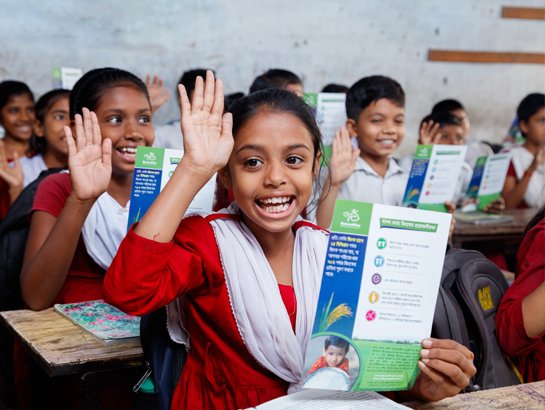In the rural village of Shreekhata, in Lalmonirhat District of Bangladesh, students at the local school for secondary education were gathered for a special session on improved nutrition—something different from the standard curriculum and the usual subjects they study. The teacher hushed the flurry of excitement by the young boys and girls so the facilitators could begin the lesson.
In the classroom, the students began to listen and took notes, as the facilitators in the session explained the importance of micronutrients for their developing brains and bodies. The facilitators used a simple PowerPoint presentation to share the information with the students and also gave a one-page handout with basic nutrition information that the students could keep.
In addition to the importance of vital micronutrients like vitamin A, iron, and zinc, the students are also educated on different crops that provide those essential nutrients. They learn about biofortification, the process that increases the level of micronutrients like zinc in staple crops to make them more nourishing for people.
The facilitators explained to the students that there are numerous varieties of rice that have been biofortified to contain a higher level of zinc, an essential micronutrient for healthy growth and development. The facilitator also explained the different features of the zinc rice grains, their yield, and the process of growing the crop.
Many of the students, who mostly live in rural farming communities, took the information leaflets with them and shared the material with their families at home. Consequently, the school’s administration was approached by many parents who wanted to learn more about zinc rice and how they could procure the seeds for their next harvest. Some parents also contacted the local organizations who conducted the information sessions in the schools, asking for more information on varieties of biofortified seeds and where they could purchase them for growing nutritious crops.
Mohammad Sariful Islam, a student in grade 10 in Shreekhata village, said: “I heard in the school that zinc helps in the mental and physical growth of children. Zinc is required in our bodies every day. It reduces malnutrition of mothers and children. We can get zinc through zinc rice. Knowing the importance of zinc rice, I convinced my parents about the cultivation of zinc rice . My parents decided to cultivate zinc rice on our land after we are done harvesting tobacco.”
These in-school lessons were a part of the partnership between HarvestPlus and 12 local organizations to visit classrooms across the country and educate schoolchildren about basic nutrition. This drive to create awareness among the 13-to 15-year-old students, both boys and girls, about the importance of zinc for human health, reaped excellent results when parents started showing interest in what their children had learned. Such awareness-raising events are critical to the process of promoting adoption of zinc rice—a very serious decision for farming families who depend on their crops for their own sustenance and income.
 Last year, the program reached more than 6000 students, including 3500 girls, through 83 school-sensitization sessions. Since 2016, these lessons have been imparted to more than 17,000 students, including 9200 girls. The students were made aware of the importance of consuming nutritious crops for their optimal health.
Last year, the program reached more than 6000 students, including 3500 girls, through 83 school-sensitization sessions. Since 2016, these lessons have been imparted to more than 17,000 students, including 9200 girls. The students were made aware of the importance of consuming nutritious crops for their optimal health.
Almost 30 percent of the Bangladeshi population suffers from inadequate zinc intake. Zinc deficiency contributes to stunting and a loss of appetite, lowers immunity, and increases the risk of diarrheal disease and respiratory infections. According to research, the zinc-biofortified variety of rice, Bangladesh’s most popular staple food, can provide up to 60 percent of daily zinc needs if eaten regularly. According to the World Bank, Bangladesh loses over US$700 million in GDP annually to mineral and vitamin deficiencies.
HarvestPlus has partnered with the Bangladesh Rice Research Institute (BRRI), the International Rice Research Institute (IRRI), Bangladesh Institute of Nuclear Agriculture (BINA), and the Bangabandhu Sheikh Mujibur Rahman Agricultural University (BSMRAU), to develop zinc rice. HarvestPlus also works with more than 30 public, private sector, and nongovernmental partners to multiply and distribute seed, educate farmers on the benefits of zinc rice, and promote wider adoption and consumption of the crop through public awareness campaigns. The aim is to improve nutrition and public health in Bangladesh by promoting biofortified rice that can provide more zinc in the diet for everyone.
These awareness-raising sessions, reaching thousands of students across schools in Bangladesh, have been critical in getting the conversation started early to educate young boys and girls on the basics of good nutrition.
Contact: Khairul Bashar, HarvestPlus Country Manager, Bangladesh ([email protected])
